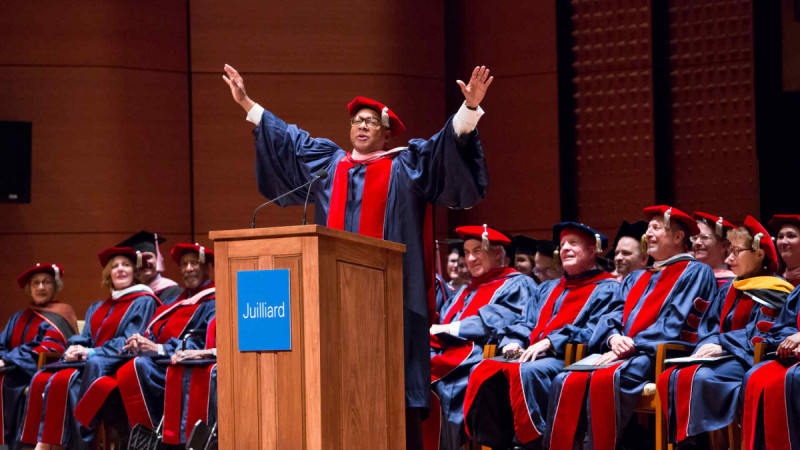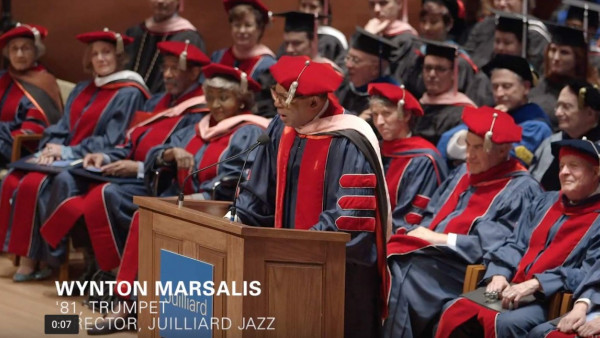Wynton Marsalis Addresses Juilliard’s 294 Graduates

“Your art can be the vaccine for the types of self-involved hysterias that have so often stained human history,” Wynton Marsalis told Juilliard’s nearly 300 graduates and their family members and friends at the school’s 113th commencement ceremony.
“We are challenged to achieve perfection,” Marsalis, who studied trumpet as an undergraduate at Juilliard and has been the director of Juilliard Jazz since 2014, said. “Graduates, you are the person called to sing, play, or dance for guests after dinner. You are called to play for the sick and shut-ins and to sing when the national spirit is shaken. You are called upon to minister substance to the world.”
The ceremony, which took place in Alice Tully Hall on May 18, had a special poignance and energy because it was the final one under President Joseph W. Polisi, who began his tenure at the school in the fall of 1984. “You will understand if my mind is awash in a flood of memories composed of people, events, and past graduation ceremonies,” Polisi said. “But the one realization I have continued to return to is that the Juilliard experience is truly a noble one reflecting the very best of human values, and that you, our exceptional graduates, represent the future of dance, drama, and music around the globe.” Adding that this reflection comes at a time when “the arts embody values that are currently lacking in our national environment,” he enumerated those values: civility, nuance, dignity, and discipline. Polisi closed his speech by noting that he could “finally say after 34 years that I will be graduating from Juilliard with you today.”
“Your art can be the vaccine for the types of self-involved hysterias that have so often stained human history,” Wynton Marsalis told Juilliard’s nearly 300 graduates and their family members and friends at the school’s 113th commencement ceremony.
“We are challenged to achieve perfection,” Marsalis, who studied trumpet as an undergraduate at Juilliard and has been the director of Juilliard Jazz since 2014, said. “Graduates, you are the person called to sing, play, or dance for guests after dinner. You are called to play for the sick and shut-ins and to sing when the national spirit is shaken. You are called upon to minister substance to the world.”
The ceremony, which took place in Alice Tully Hall on May 18, had a special poignance and energy because it was the final one under President Joseph W. Polisi, who began his tenure at the school in the fall of 1984. “You will understand if my mind is awash in a flood of memories composed of people, events, and past graduation ceremonies,” Polisi said. “But the one realization I have continued to return to is that the Juilliard experience is truly a noble one reflecting the very best of human values, and that you, our exceptional graduates, represent the future of dance, drama, and music around the globe.” Adding that this reflection comes at a time when “the arts embody values that are currently lacking in our national environment,” he enumerated those values: civility, nuance, dignity, and discipline. Polisi closed his speech by noting that he could “finally say after 34 years that I will be graduating from Juilliard with you today.”
In all 294 students, from 25 countries, graduated this spring. There were 122 undergraduate degrees awarded (Diploma, BFA, and BM) and 172 graduate degrees (Graduate and Artist Diplomas, MFA, MM), including a record 11 DMAs. Prizes given at the ceremony included the Richard F. French Doctoral Prize (Ross Scott Griffey, Christopher Dylan Herbert, and Hélène Werner), John Erskine Prize (Manon Gage), Martha Hill Prize (Amanda Bouza), Michael and Suria Saint-Denis Prize (Nicholas Podany), Peter Mennin Prize (Matthew Liu and Olivia Staton), William Schuman Prize (Evan Atwell-Harris and Sumire Hirotsuru), and the Joseph W. Polisi Prize (Brittany Bradford, Thomas Woodman, and Jeffery Miller). The interlude, the rondo from Devienne’s Quartet in C Major for Bassoon and Strings, Op. 73, No. 1, was performed by Cornelia Sommer, Brian Hong, Jordan Bak, and Yi Qun Xu. Honorary doctorates were awarded to arts world leaders Grace Bumbry, Ron Carter, Lynn Nottage, Tina Ramirez, and Ann Ziff.
In closing his commencement speech, Marsalis paid tribute to Polisi. “He’s followed, as Harriet Tubman did, the North Star,” he said. “Take the example of Joe Polisi to heart. He left us much, much better than he found us, and that is the definition of soul.”
by Susan Jackson
Source: Juilliard Journal

